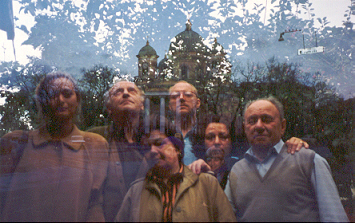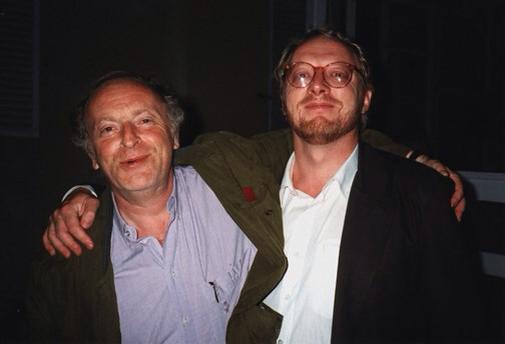Joseph Brodsky’s Rooms
Almost every summer from 1988 to 1994 Joseph Brodsky
spent a few
weeks in Sweden, and many of his works – poetry,
prose, plays –
were written or finished here. The book about
Venice, for instance
(Watermark), he worked on in a corner
room of the Hotel Reisen,
with the Baltic sea and the sailing ship af Chapman
before his eyes:
hence the salmon that “leap out of the water
to greet you”.
The room at the Reisen was an ordinary hotel
room, but rather big.
Not too big, but on the borderline of what Brodsky
would accept. Yet
he could work here; perhaps the suffocating
abundance of space was
compensated for by the view of the element he
loved the most: water,
this form of condensed time.
Rooms, the size and shape of rooms, were
constantly on Brodsky’s
mind – since he was constantly in need of provisional
spaces to be able
to work. He spent the summer in Europe, escaping
the humid heat of
New York, so perilous for somebody with a heart
condition. Those of
his friends who, year after year, did their best
to try to satisfy the poet’s
need to work in peace – in London, Paris, Rome,
or Stockholm –
know how difficult it was. Even for someone who
thought he knew
something about Brodsky’s preferences it was
impossible to foresee
how he would react to the proposed square meters.
Water, one would
think, a smashing view, zinc-grey waves – in
theory everything squared;
yet he would say no or could not make up his
mind, and the project
petered out in the sand.
A couple of summers he stayed as long as
he could, i.e., as long as he
could afford – usually a few weeks – at the
Mälardrottningen,
a hotel
boat anchored in the Old Town. The cabin was
small, maybe a bit too
small, but in this case the clucking proximity
to water more than
compensated for the obvious lack of space.
Two summers in a row he stayed in different
apartments around
Karlaplan, a residential area in the centre of
Stockholm. In one of
them, he retired to the maid’s room, although
the vacationing owners
had put the whole apartment at his disposal.
It felt better that way, and
in addition the World Championship in football
was in full swing and
the TV set stood in that part of the flat. The
other was a one-room
apartment, and it nearly ended in disaster right
at the threshold: the
walls were painted an ascetic white and decorated
with the sort of
“modern” art that Brodsky despised: “This century’s
stuff”, which has
only one function, “to show what a cheap, self-assertive,
ungenerous,
one-dimensional lot we have become”. In spite
of this, he stayed for
over a month and wrote, among other things, the
play “Democracy!”
That he stayed so long was partly due to
the fact that, with time, the
interior began to fascinate him: in this cross
between a mental institution
and a museum of modern art he found an explanation
of the quiet
Nordic lunacy he saw manifested in the films
of Ingmar Bergman. But it
was also an expression of an important trait
in Brodsky’s psyche: after
some time, he domesticated all spaces where he
lived, and moving out
was always a painful process for him, especially
if the work went well.
In any case, it was not because of a lack of
alternatives – after all, there
were always hotel rooms – or of delicacy: a person
who has fled the
palace of Fiat boss Agnelli has no problem abandoning
a one-room
apartment in Stockholm.
One year there was a summerhouse at lake
Vättern; but most of all he
preferred Stockholm and its archipelago: the
same waves and the same
clouds that had earlier visited his home realm,
or vice versa; the same
herring – if only sweeter – and the same vessel-widening
– if only
bitterer – vodka.* In a house on the island
Torö, with a mind-boggling
view of the razor-blade-sharp horizon, the poem
“Lecture for a
Symposium” with its aesthetic-geographic credo
was written in 1989:
But having loosened itself from the body,
the eye prefers to settle somewhere
in Italy, Holland, or Sweden.
But, as said, it mustn’t be too big, the
space where he was to live and
work. If there was a smaller house on the property,
he chose that. And in our flat Brodsky immediately pointed out his favourite
space: a dark
balcony facing the courtyard, about the size
of the cabin at the
Mälardrottningen, perhaps a bit smaller.
In any case, smaller than ten square meters,
the size of the space that
had for all future defined Brodsky’s view of
the ideal room. These ten
square meters were his part of the “room and
a half” which he had
shared with his parents in a communal flat in
central Leningrad and that
he has described in an essay – one of the best
childhood accounts ever
in English or in Russian literature. Here he
lived until he was exiled in
1972, and here his parents died, in the absence
of their son, some ten
years later: Liteiny pospect 24, flat 28.
“My half”, he wrote, “was connected to their
room by two large,
nearly-ceiling-high arches which I constantly
tried to fill with various
combinations of bookshelves and suitcases, in
order to separate myself
from my parents, in order to obtain a degree
of privacy. One can
speak only about degrees, because the height
and the width of those
two arches, plus the Moorish configuration of
their upper edge, ruled
out any notion of complete success.”
The construction of barricades, initiated at the
age of fifteen, intensified
as the books and the hormones made their demands.
By reshaping a
bookshelf – he removed the back but kept the
doors – Brodsky
created another entrance to his half: a visitor
had to make his way
through two doors and a curtain. And to conceal
the nature of what
was going on behind the barricade he used to
play classical music on
his record player. His parents learned to hate
Bach, but the musical
curtain fulfilled its mission and “a Marianne
could bare more than just
her breast”. When, with the time, the music was
supplemented by the
rattling sound of an “Underwood”, his parents’
attitude became more
condescending.
“That was,” writes Brodsky. “my Lebensraum.”
His mother cleaned
it, his father passed through it on his way in
and out of his darkroom,
and sometimes one of his parents would seek refuge
in his ragged
armchair after some verbal battle. “Other than
that, these ten square
meters were mine, and they were the best ten
square meters I’ve ever
known.”
Brodsky never again saw either his parents
or this Lebensraum, which
he almost maniacally tried to re-create in other
places throughout the
rest of his life. He never again saw the room
because he never returned
to his hometown; and he never returned to his
hometown because his
thinking – and acting – was linear. “A person
moves only in one
direction. And only from. From a place,
from the thought that entered
his head, from himself.” In short, because from
the age of thirty-two he
was a nomad – a Vergilian hero, doomed never
to return home.
Yet he was on his way many times, at least
in his thoughts. When, after
the Nobel Prize and, especially, after the fall
of the Tyranny, it became
possible to return, he was often asked why he
didn’t. His arguments
were manifold: he didn’t want to come back to
his home country as a
tourist. Or: he didn’t want to go on an invitation
from official
institutions. The last argument was: “The best
part of me is already
there: my poetry.”

Photo: © Bengt Jangfeldt
Nevertheless, he came back. In January,
1991, a symposium about
Brodsky was arranged in Leningrad. One afternoon
we made an
excursion to the house with the room and a half,
and I took pictures
that I planned to send him to New York. This
will make him happy, I
thought: pictures of his old friends before his
Lebensraum. For almost
as strong as the poet’s nomad instinct was its
opposite: nostalgia.
Half of the roll had been shot in Stockholm,
and I finished it in
Leningrad. When it was developed, the pictures
turned out to be
double-exposed. And not one or two, as might
easily have happened,
but all of them.
The photos taken in Stockholm show Joseph
and his wife with my
family, and these had been projected on the pictures
from Leningrad.
On one picture he stands before flat 28, on another
he looks at the
balcony of the room and a half, with the Cathedral
of the Saviour in the
background. In this way, Brodsky returned to
his ideal space; if it
happened by means of a technical mishap, it was
perhaps because he
was the son of a photographer.
After spending some time trying to understand
what had happened, I
drew the only reasonable conclusion, i.e., that
somewhere in the middle
the film had changed direction and returned,
frame by frame, to the first
exposure – to the room and a half. In other words,
the film had made
the movement that Brodsky himself was incapable
of: back.
* Broskys’ favourite Swedish vodka
was Bäska droppar (”Bitter drops”), made on wormwood.

|

![]() © 2003-2011 Ars Interpres Publications.
© 2003-2011 Ars Interpres Publications.